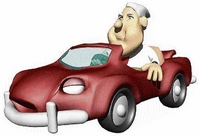
When a motorist sits behind the steering of a motor car, he/she becomes one with the machine. And, if the driver is physically and mentally prepared, the vehicle should perform at its peak.
"The key to the entire operation of defensive driving is the driver," says consultant psychiatrist Dr Wendel Abel.
According to Dr Abel, driving is an activity of the mind. However, our bodies translate the impulses of our thoughts as the challenges are faced.
being in control
A driver who is alert, sits upright with his/her head up and hands on the wheel creates an impression of being in control.
"Fatigue arrives very quickly when muscles are taut, therefore, every effort should be made to remain physically relaxed, while being mentally alert," Dr Abel said.
French fighter pilot and Grand Prix driver of the 1920s and 1930s, Robert Benoist, embraced the view that the stability of the car depends on the personal stability of the driver.
A positive mental attitude and stability are essential to defensive driving.
A person who has had a quarrel may release his anger and frustration by driving aggressively. So too, a mourner may be distracted by his/her grief.
Minor illness and ailments also can also slash reflexes and driving efficiency.
The smart driver practises safe-driving practices as well as a positive attitude as this may mean the difference between life and death.
- Paul Messam